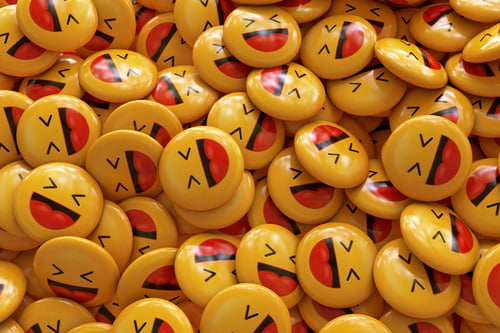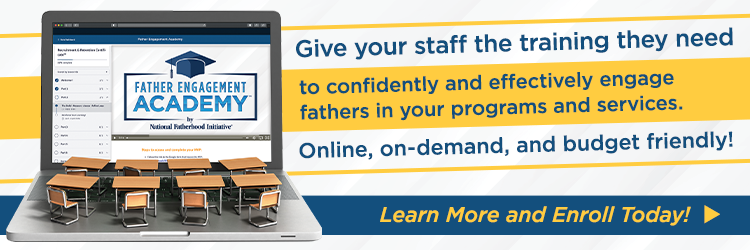
I observed a facilitator deliver a session from National Fatherhood Initiative®'s (NFI’s) 24:7 Dad® program on Working With Mom and Co-Parenting. The dads had been sharing difficult situations that weighed heavily on the group. When the facilitator shared a funny story about how he parented differently than his wife, the atmosphere in the room immediately lightened. Dads added humorous stories of their own. Bonding deepened, and the session ended on a high note.
Family history. Expressing emotions. Masculinity. Co-parenting. Many topics in fatherhood programs are serious.
While hitting these issues and allowing dads to wrestle with them is crucial, it’s equally important to lighten the group atmosphere.
Here are three reasons why you need to use humor in your fatherhood groups:
- Laughing improves communication. Laughter breaks down barriers between you and the dads and among themselves. One study showed that shared laughter communicates to others that we have a similar worldview, strengthening relationships. When dads see what they have in common, they are free to embrace each other’s diversity.
- Laughing is a stress reliever. Laughter reduces stress hormones like cortisol, epinephrine(adrenaline), and dopamine. It also increases levels of health-enhancing hormones, like endorphins. These are important ingredients in helping dads process difficult emotions since it creates a pressure valve to release the tension that comes with vulnerability.
- Laughing increases empathy. Social psychologist Barbara Fredrickson found in her research that laughter allows people to see beyond their needs, wants, and interests and be able to take others’ perspectives. This ability to see through other people’s eyes is critical for healthy group dynamics.
Ultimately, laughter signals that the group setting is safe for dads to be vulnerable and tackle the heavy topics in any fatherhood program.
So, how can you harness the power of humor during your group sessions?
- Laugh at yourself. When you do something silly or wrong, mention it and laugh at it. When you don’t take yourself too seriously, it makes it safe for dads to do the same.
- Use yourself as an example. If you have a funny story that can help explain a concept, tell it. This helps build a connection between you and the dads while letting them know you’re on a journey of self-discovery with them.
- Use stories and comments from dads. When a dad shares a humorous story or comment, ask if you can use it in future group sessions. Sharing stories from past groups sets the stage for the current group to do the same.
- Be authentic. You have your personality and style of humor, so own it. Humor has a subjective nature to it. What one person finds funny, someone else may not. However, when you are consistent in your humor, others will learn to appreciate it.
- Use appropriate humor. Humor should not be hurtful or offensive. Be considerate of what your dads may have experienced. Ask yourself, “Will this humor alienate or embarrass any of my dads?”
- Use dad jokes. A dad joke is defined as “a wholesome joke told by dads with a punchline that is often an obvious or predictable pun or play on words and is usually judged to be endearingly corny or unfunny.” You can use dad jokes anytime in your sessions, but kicking off or ending your time with them works great. Kelly Kendall, Program Coordinator for Utah State University’s Department of Human Development & Family Studies, created this collection of dad jokes that you can use.
- Use clips from movies, television shows, and social media. Facilitate bonding and learning among your dads by using funny clips to bring the topic to life. Ask dads if they thought it was funny and why. Ask if they’ve experienced a similar situation.
Humor is a powerful way to bond with dads, help dads process difficult emotions, and ensure dads get the most out of your fatherhood program.
Do you want to hear a construction joke? Sorry, I’m still working on it!
How do you incorporate humor into your fatherhood program?
Which of the tips above was the most valuable to learn?



